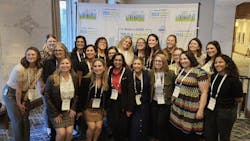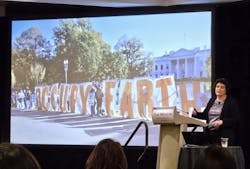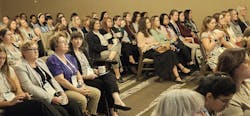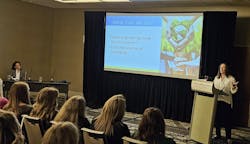Chicago IL, September 27, 2024 -- You know you're not just at any first meeting of a new ASHRAE subset when you look around and notice the SRO crowd includes the current Society president, two past presidents, and one president-elect.
And then you realize this is no ordinary engineering meeting when the conference keynote earnestly tells a roomful of professional women, "Our deeds will be the love that we leave behind."
Okay, those are words I've never heard in the construction industry before, I thought.
Thirty minutes later at the coffee break, a veteran engineer from San Diego came up to me, reached out her hand and said, "Thank you for being an ally." After we shook, I looked around to see maybe four males in a sea of 150 smiling faces. Then it hit me. This was not just a meeting. It was a movement.
And to be honest, as both a reporter and the father of a daughter in her 20s, I was thrilled to be a witness to this moment in industry history.
Having covered dozens and dozens of conferences over the last 35 years, I was truly struck by how unusually personal and motivational the program was. Indeed, the opening sessions of the first-ever Women in ASHRAE Leadership Symposium were just a virtual firehose of inspiration and nurturing solidarity. How so? Well, read on...
Conference keynote Erin McConahey, PE FASHRAE, Principal, ARUP:
"We need leaders who are socially cultivated to care," said McConahey, who joined Arup in 1995 and holds degrees in both mechanical and structural engineering. She has been a principal at the global engineering giant for 15 years, and now heads its Net Zero Carbon Buildings team, which collects "Whole Life Carbon Assessment" data on each of the firm's projects every year.
Now Arup's internal sustainability evangelist and watchdog, McConahey had been the one to propose such a team after having a professional epiphany, she recalled. "One Earth Day on the news, I saw protesters outside the White House holding this sign," she said, calling up a slide showing people behind a banner reading OCCUPY EARTH. "That sign was like a punch in the gut. I realized I had carbon on my hands, too."
Since then, McConahey has been on a mission, and she has come to realize that invariably young women engineers seem to be more receptive to her message. But too many are still too hesitant to lead, she has found. Too many young women have been conditioned to doubt themselves and to avoid making waves in an overwhelmingly male-dominated industry.
"It's not quite the impostor syndrome, but we have convinced ourselves that we are too small to make a difference," she added. "But I eventually realized that I did not have to be any bigger. I just had to be big-hearted. After all, what is it that drives people? Love. What do you love deeply enough that it will cause you to mobilize all your talents?"
And such mobilization in service to that passion is inherently unselfish, she added. "Some people choose to gain power to hold it over others," McConahey said, clearly hinting at current politics. "Some people gain power to give it away."
That sharing leads to greater collaboration and better decisions that the whole team can buy into, she added. Then McConahey escalated her call to arms.
"Your opportunity for transformational leadership is here. We all have the opportunity to change the future, but the future is calling us to act now," she said. "The future is calling. Do you hear it?"
Once again stressing the urgency needed to act on climate change, despite the daunting enormity of the global challenge, McConahey added, "There is still hope because of people like us... Our deeds will be the love that we leave behind. We need your leadership now."
Symposium attendees included current ASHRAE President M. Dennis Knight, Immediate Past President Ginger Scoggins, President-Elect Bill McQuade, and 2018-19 President Sheila Hayter. Event Chair Nancy Kohout, President-Elect of the Illinois ASHRAE chapter, kicked off the two-day event at the Westin Michigan Avenue Hotel in downtown Chicago.
"The goal was 200 registrants," said Kohout with a smile. "We got 240."
Confidence & Competence
This session was led by Julia Keen, PE, PhD, HBDP, Fellow Member, Kansas State University; and Jennifer Leach, PE, LEED AP; BR+A Consulting Engineers, Vienna, VA.
"I had a young woman in one of my classes who said in a self-evaluation that she lacked confidence," recalled Dr. Keen. "Really? I thought. Every situation that I had seen her in, she communicated as a leader. But then I came to realize that was only when she was among other women. Among men, she acted differently."
Indeed, from childhood, the ingrained behavior patterns between the genders still shapes so much of how we act as adults, even among professional engineers. One example is when young women, often the only female in the room collaborating on a project, unwittingly engage in "self-sabotage talk" while offering suggestions. Such language might include opening phrases like, "This might be a really bad idea, but..." or "I'm not the best at math, but..." or "I'm no expert at this, but..."
Asked Dr. Keen, "Who is going to put any value on what comes next after a statement like that? You need to embrace your abilities and your contributions."
Added consulting engineer Leach, "You have to believe that you have value. We need you to change the culture of this profession."
Echoing McConahey's earlier words, Leach added that women have a built-in attribute that they just need to find the confidence to use. "We are genetically programmed to take care of people."
Toward that end, she and Dr. Keen both said that women need to take care of themselves, too.
And that can mean deciding to leave toxic work environments, rather than trying to stick things out in hopes of change. "Why keep fighting and feeling unhappy every day?" she asked. "And it is isolation, not sexual harassment, that more often causes the greatest distress. It can be like water torture, one drip at a time, that slowly makes some jobs intolerable."
Ironically, when young women do finally leave such jobs, it often helps to feed the stereotype that they are leaving to start a family. And that popular but misleading narrative invariably leads employers to the conclusion that young women can't be relied upon in leadership.
"Men assume that women leave to have families, but it's not true," said Dr. Keen.
In reality, young women engineers are just smarter now about leaving when the fit is not right and their path to advancement is blocked. "Don't stay at a place where you don't want to be. It will seal your future," she added.
"Culture, culture, culture," said Leach. "It's finally changing, primarily because young men in our industry now want it to change, too."
And for those women who actually do "leave" to have families, their absence is often temporary. In fact, many of the women leaders in attendance have their own children, including Symposium Chair Kohout, who has four, and Past President Scoggins, who has three.
Importance of Mentors, Allies
Those young men and older dad-types, can make a huge difference. "Male allies at work are very important," said Leach.
Added Dr. Keen, "We all really need three mentors at our jobs -- the technical mentor (for engineering questions); the ethical mentor; and the workplace mentor."
But they can't all be the same person because, for instance, you don't necessarily want to confide in your manager about some anxiety or nervousness regarding a task. That could just cause your manager to take that task off your plate and label you as less proficient.
Past presidents Hayter and Scoggins both rose to echo the call for more mentors.
Of note, Scoggins talked about the experience years ago of seeing some women on projects who might bristle in a conference or planning room when another woman walked in. That reaction suggests that the woman already at the table is afraid there is only enough room for one woman there.
"So we have to come to the leadership table with an attitude of abundance," she said. "We need to welcome other women to that table."
Indeed, as I left the symposium's first day of sessions, I definitely had the sense that our industry's leadership table was now set to grow... soon and exponentially.
##########
About the Author
Rob McManamy
Editor in Chief
An industry reporter and editor since 1987, McManamy joined HPAC Engineering in September 2017, after three years with BuiltWorlds.com, a Chicago-based media startup focused on tech innovation in the built environment. He has been covering design and construction issues for more than 30 years, having started at Engineering News-Record (ENR) in New York, before becoming its Midwest Bureau Chief in 1990. In 1998, McManamy was named Editor-in-Chief of Design-Build magazine, where he served for four years. He subsequently worked as an editor and freelance writer for Building Design + Construction and Public Works magazines.
A native of Bronx, NY, he is a graduate of both the University of Virginia, and The John Marshall Law School in Chicago.
Contact him at [email protected].




